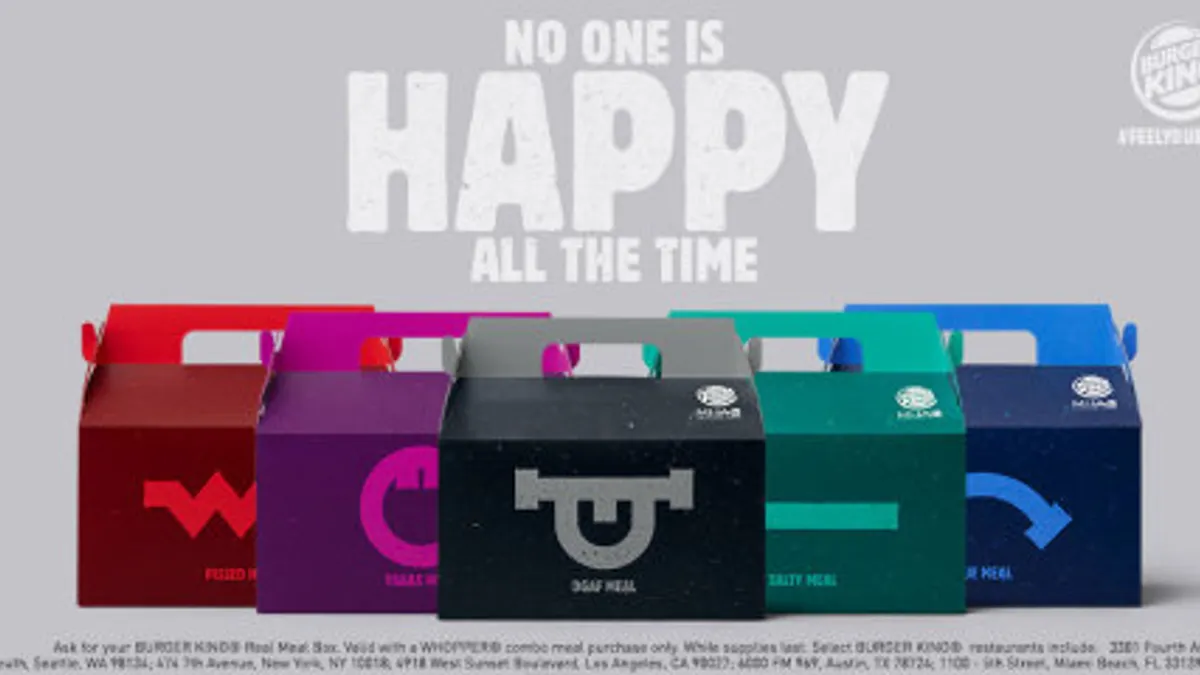Dive Brief:
- Burger King has launched "Real Meals," which come in a variety of "moods," including the Pissed Meal, Blue Meal, Salty Meal, YAAAS Meal and the DGAF Meal. The meals include a Whopper, fries and a drink.
- In a company news release, Burger King said the campaign is aimed at encouraging people to "be their way" and "feel their way", despite the pressures cultivated by social media to appear happy and perfect.
- Burger King is by partnering with Mental Health America as part of the campaign, and launched Real Meals to coincide with Mental Health Awareness Month.
Dive Insight:
There are plenty of cause marketing campaigns in the restaurant space. For starters, Pizza Hut tackles literacy, White Castle raises awareness for autism, Starbucks has teamed up with AIDS organization RED and Jersey Mike's donates an entire day of sales to local charities every year.
But mental health hasn't been as big of a focus for restaurant brands — at least not on this scale — until now. With the Real Meals promotion, Burger King is swimming into unchartered waters and boldly de-stigmatizing mental health issues. This collection of boxes spans the gamut of emotions like a sort of edible mood ring.
Such nuance could be interpreted as a direct swing at McDonald's and its famous Happy Meals, and it wouldn't be the first time Burger King has targeted its rival recently. In December, Burger King rolled out a "Whopper Detour" that relied on mobile geofencing to steer customers away from McDonald's. As part of that campaign, mobile users who came within 600 feet from most McDonald's locations could order a Burger King Whopper for a penny on its revamped app.
Though specifics of this specific campaign were not shared during Burger King's Q1 earnings call, executives said they were pleased with customers' engagement on the app, including through the Whopper Detour campaign. The BK mobile app usage continues to grow with more than 8 million downloads and approximately 3 million monthly active users, they added.
Though the company likes this progress, trolling McDonald's specifically probably doesn't do much to bridge the gap between the two companies. McDonald's average unit volumes are about $2.7 million, while Burger King's is about $1.4 million, for example.
But perhaps overtaking its rival isn't Burger King's top priority here. Mental health has become an important topic of late as suicide rates — particularly among teens — rise and as the suicides of high-profile celebrities, like Anthony Bourdain, push the story above the fold. Stress, depression and substance abuse are persistent problems in the restaurant industry, so Burger King's campaign could help shed some light on the issue and help facilitate action.
And it shouldn't be bad for business, either, as consumers tend to respond favorably to cause marketing. According to Aaron Allen & Associates, 43% of U.S. consumers want to see a company's charitable efforts impact their community. Further, 90% of U.S. shoppers said they are likely to switch to a cause-branded product, while 50% of consumers globally are willing to spend more on a product associated with philanthropy.















